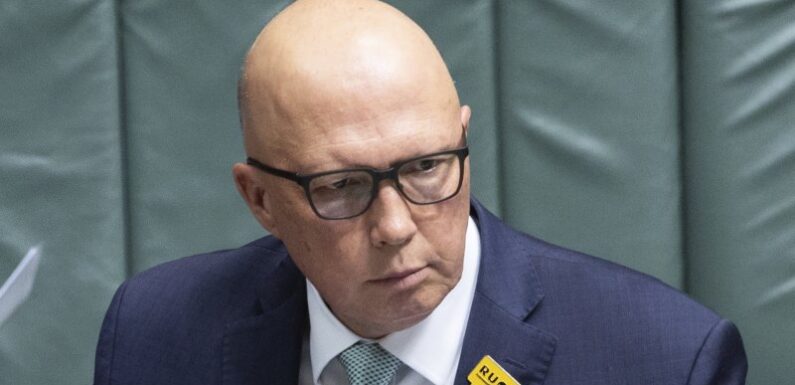
Save articles for later
Add articles to your saved list and come back to them any time.
The divide in the campaign against the Voice over signing treaties with First Nations people has deepened, with Opposition Leader Peter Dutton dismissing the prospect one day after a leading No campaigner backed the idea.
Dutton ruled out spending billions of dollars on treaties if he secured government and told voters he wanted to spend money on practical outcomes instead.
Opposition Leader Peter Dutton said treaty negotiations would only make money for lawyers rather than helping Indigenous communities.Credit: Alex Ellinghausen
But supporters of the Voice highlighted the split as proof the No side was “all over the place” on whether the defeat of the Voice would clear the way for treaty negotiations, as No campaigner Warren Mundine suggested on Sunday.
Prime Minister Anthony Albanese has assured voters that a decision on the Voice to parliament is “not about a treaty”, despite comments from some Indigenous leaders who want the advisory group to clear the way for treaties.
Dutton said treaty negotiations would make money for lawyers in the big cities rather than helping Indigenous communities.
“I can promise you as prime minister I won’t be prioritising treaties with billions of dollars going to lawyers instead of helping those communities in a practical way,” he said on Monday.
“I want to see money spent on practical outcomes for Indigenous kids in remote and regional areas.
“I don’t want to see billions of dollars spent on treaties where lawyers will line their pockets, and treaties that are negotiated for 20 or 30 years – it’s completely unacceptable.”
Asked about Mundine’s comments, Dutton said: “The prime minister’s talking about treaties after the Voice.”
In fact, Albanese has not argued for treaties after the Voice and has instead played down the prospect.
“This is not about a treaty,” Albanese said four times in an interview with 2GB radio host Ben Fordham on July 19.
However, the government has spoken in the past of its support for the treaty concept. “We are very committed to Voice, truth and treaty; it’s crucial,” Indigenous Australians Minister Linda Burney said on ABC Radio National last October.
The No campaign is using social media posts to warn people that the Voice would clear the way for treaties, citing comments from Yes campaigners who have debated the idea of a treaty and reparations to compensate First Australians for the impact of white settlement.
At the same time, independent Victorian senator Lidia Thorpe is voting No to the Voice in the belief it is better to seek treaties than to set up the advisory group.
Mundine said 55 per cent of Australia was already in Aboriginal ownership and treaties could help resolve disputes as the nation moved towards “70 to 80 per cent” Aboriginal ownership in the next two decades.
“I think it needs to resolve the issue of sovereignty, it needs to give certain protection of Aboriginal culture and Aboriginal heritage on these lands.
“And we’re moving very strongly in that position with the land rights acts and the native title acts, where the Aboriginal people have a major say on what happens on their land.
Mundine told the ABC’s Insiders program on Sunday that a No vote would help start a process toward those treaties.
“So your message is to vote No and the treaties process will really begin?” he was asked.
“Yeah, and also the real things about accountability in education and jobs need to be done,” he replied.
University of Technology Sydney associate professor Harry Hobbs said a treaty process would not need the Voice but the advisory group might help the path towards those negotiations.
“A Voice could work with the government to develop the key institutions and processes that make treaty possible,” he said.
“In terms of what a treaty could achieve, this would be subject to the negotiation parties. In Canada, treaties cover rights to land, cultural heritage protections, land management and resource issues, and self-government powers that generally amount to local government.
“These agreements are protected in the Canadian constitution, and are subject to it and Canadian law.”
Cut through the noise of federal politics with news, views and expert analysis from Jacqueline Maley. Subscribers can sign up to our weekly Inside Politics newsletter here.
Most Viewed in Politics
From our partners
Source: Read Full Article
